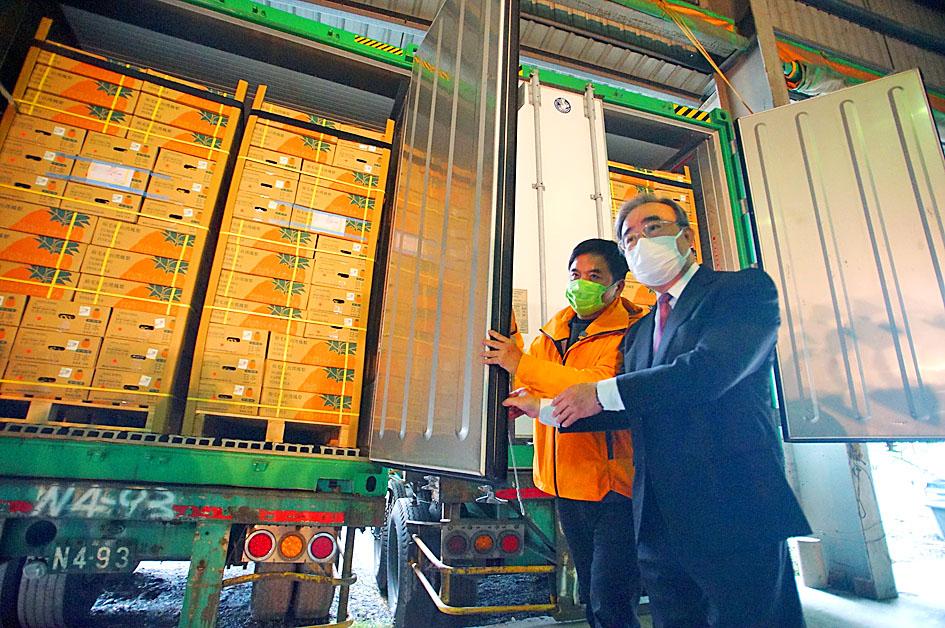Annual exports of Taiwanese pineapples could reach 30,000 tonnes by the end of this year, with the majority heading to Japan, Council of Agriculture Minister Chen Chi-chung (陳吉仲) said on Saturday.
Japan imported 18,000 tonnes of pineapples from Taiwan last year after China unexpectedly banned the fruit as part of a trade dispute, Chen said.
So far this year, Taiwan has exported 1,832 tonnes of pineapples, 1,742 of which were sent to Japan, he said.

Photo: Chen Yen-ting, Taipei Times
Taiwan also exported 2 tonnes of pineapples to Kuwait, the first time Taiwan has exported fruit to the Middle East, he added.
The council has developed a cold-chain export system to make it easier to export fruit, he said.
Japan has ordered 20,000 tonnes of Taiwanese pineapples so far this year, Agriculture and Food Agency Director-General Hu Jong-i (胡忠一) said.
“There is demonstrable demand in Japan for Taiwanese fruit,” Hu said. “Some importers there have increased their orders after seeing how well the fruit is selling. One Japanese importer who ordered 137 tonnes last year ordered 852 tonnes this year.”
Japanese demand for Taiwanese pineapples reflects the high quality of the nation’s fruit, he said.
“In Japan, Taiwanese fruit is subject to a 17 percent tariff. Fruit from the Philippines is much cheaper,” he said. “If Japanese are choosing Taiwanese fruit over domestic fruit or that from the Philippines, it really speaks to the quality of our fruit.”
Hu also discussed improvements to the export process.
“We are using a cold-chain system throughout the process, from harvest to shipping, and we are asking farmers to adopt a standard operating procedure,” Hu said.
“We found that cutting the pineapples allows them to be stored for two additional days. We are demonstrating effective packaging and shipping practices at our cooperative in Pingtung County,” he said.
Automated production has also been employed where possible to ensure efficient and proper packaging, he said, adding that there would not be a recurrence of a rotten fruit problem that affected some shipments last year.
The agency is also closely monitoring the use of pesticides and testing foods prior to export to ensure they meet strict regulations, he added.

Taiwanese can file complaints with the Tourism Administration to report travel agencies if their activities caused termination of a person’s citizenship, Mainland Affairs Council Minister Chiu Chui-cheng (邱垂正) said yesterday, after a podcaster highlighted a case in which a person’s citizenship was canceled for receiving a single-use Chinese passport to enter Russia. The council is aware of incidents in which people who signed up through Chinese travel agencies for tours of Russia were told they could obtain Russian visas and fast-track border clearance, Chiu told reporters on the sidelines of an event in Taipei. However, the travel agencies actually applied

Japanese footwear brand Onitsuka Tiger today issued a public apology and said it has suspended an employee amid allegations that the staff member discriminated against a Vietnamese customer at its Taipei 101 store. Posting on the social media platform Threads yesterday, a user said that an employee at the store said that “those shoes are very expensive” when her friend, who is a migrant worker from Vietnam, asked for assistance. The employee then ignored her until she asked again, to which she replied: "We don't have a size 37." The post had amassed nearly 26,000 likes and 916 comments as of this

New measures aimed at making Taiwan more attractive to foreign professionals came into effect this month, the National Development Council said yesterday. Among the changes, international students at Taiwanese universities would be able to work in Taiwan without a work permit in the two years after they graduate, explainer materials provided by the council said. In addition, foreign nationals who graduated from one of the world’s top 200 universities within the past five years can also apply for a two-year open work permit. Previously, those graduates would have needed to apply for a work permit using point-based criteria or have a Taiwanese company

The Shilin District Prosecutors’ Office yesterday indicted two Taiwanese and issued a wanted notice for Pete Liu (劉作虎), founder of Shenzhen-based smartphone manufacturer OnePlus Technology Co (萬普拉斯科技), for allegedly contravening the Act Governing Relations Between the People of the Taiwan Area and the Mainland Area (臺灣地區與大陸地區人民關係條例) by poaching 70 engineers in Taiwan. Liu allegedly traveled to Taiwan at the end of 2014 and met with a Taiwanese man surnamed Lin (林) to discuss establishing a mobile software research and development (R&D) team in Taiwan, prosecutors said. Without approval from the government, Lin, following Liu’s instructions, recruited more than 70 software